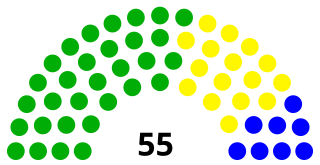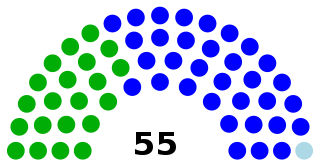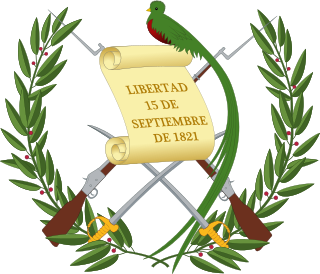
The United Progressive Party is a political party in Antigua and Barbuda. Led by Baldwin Spencer, it was the governing party from 2004 to 2014. It has been in opposition since the 2014 election.

Parliamentary elections were held in São Tomé and Príncipe on 8 November 1998. The result was a victory for the Movement for the Liberation of São Tomé and Príncipe-Social Democratic Party, which won 31 of the 55 seats in the National Assembly. Voter Turnout was 64.5%.

Parliamentary elections were held in São Tomé and Príncipe on 20 January 1991. They were the first multi-party elections for the National Assembly, following a referendum the previous year. The result was a victory for the Democratic Convergence Party-Reflection Group, which won 33 of the 55 seats, defeating the former sole legal party, the Movement for the Liberation of São Tomé and Príncipe - Social Democratic Party. Voter turnout was 77.1%.

The Cameroonian Party of Democrats is a political party in Cameroon.

Constitutional Assembly elections were held on 24 May 1964. The Movement of National Liberation and the Revolutionary Party both won 10 seats, although sixty members were appointed by the military government.
Parliamentary elections were held in Iran on 15 April 1984, with a second round on 17 May. The majority of seats were won by independents, whilst the Islamic Republican Party was the only party to win seats. Voter turnout was 65.1% in the first round.

General elections were held in Cameroon on 24 April 1988 to elect a President and National Assembly. The country was a one-party state at the time, with the Cameroon People's Democratic Movement as the sole legal party. Its leader, incumbent Paul Biya was the only candidate in the presidential election, and was re-elected unopposed.

Parliamentary elections were held in Cameroon on 1 March 1992. They were first multi-party elections for the National Assembly since 1964, although they were boycotted by the Social Democratic Front and the Cameroon Democratic Union. The result was a victory for the ruling Cameroon People's Democratic Movement, which won 88 of the 180 seats. Voter turnout was 60.7%.

Parliamentary elections were held in Cameroon on 17 May 1997. The result was a victory for the ruling Cameroon People's Democratic Movement, which won 116 of the 180 seats, including seven constituencies in which the result had originally been cancelled by the Supreme Court due to serious irregularities and the election re-run. Voter turnout was 75.6%.

Parliamentary elections were held in Nigeria on 12 December 1959. The result was a victory for the Northern People's Congress, which won 134 of the 312 seats in the House of Representatives, despite the Action Group winning more votes. It formed a coalition with five other parties and two independents, holding a total of 148 seats. Voter turnout was 79.5%.

Parliamentary elections were held in British Cameroons on 24 January 1959. The result was a victory for the Kamerun National Democratic Party, which won 14 of the 26 seats in the House of Assembly.

Parliamentary elections were held in Iran in 1961, after the elections the previous year had been annulled by the Shah. The result was a victory for the Party of Nationalists, which won majority of the seats.

General elections were held in Costa Rica on 1 February 1998. Miguel Ángel Rodríguez of the Social Christian Unity Party won the presidential election, whilst his party also won the parliamentary election. Voter turnout was 70%, the lowest since the 1950s.
The Eighth Army of Liberation was a political party in Saint Vincent and the Grenadines. It was formed by the United Workers, Peasants and Ratepayers Union, and was the only party to contest the 1951 general elections. It won all eight seats and formed the government.
The Movement for National Unity was a political party in Saint Vincent and the Grenadines. It was formed shortly before the 1984 general elections by a split from the United People's Movement due to the refusal of most party members to disown Fidel Castro's politics. Some of the support for the Movement for National Unity was the result of absorbing former members of the disbanded Youlou United Liberation Movement of the 1970s. The new party received 2.0% of the vote, but failed to win a seat. In the 1989 elections it increased its share of the vote to 2.4%, but remained seatless. However, in the 1994 elections it received 17.4% of the vote and won a single seat. In the same year it merged with the Saint Vincent Labour Party to form the Unity Labour Party.

The People's Democratic Movement (PDM) was a centrist political party in Guyana.

The Cameroonian National Action Movement was a political party in French Cameroons.

The People's Front for Unity and Peace was a political party in Cameroon.

The Group of Cameroonian Progressives was a political alliance in Cameroon.

The Socialist Party of Cameroon was a political party in Cameroon.












